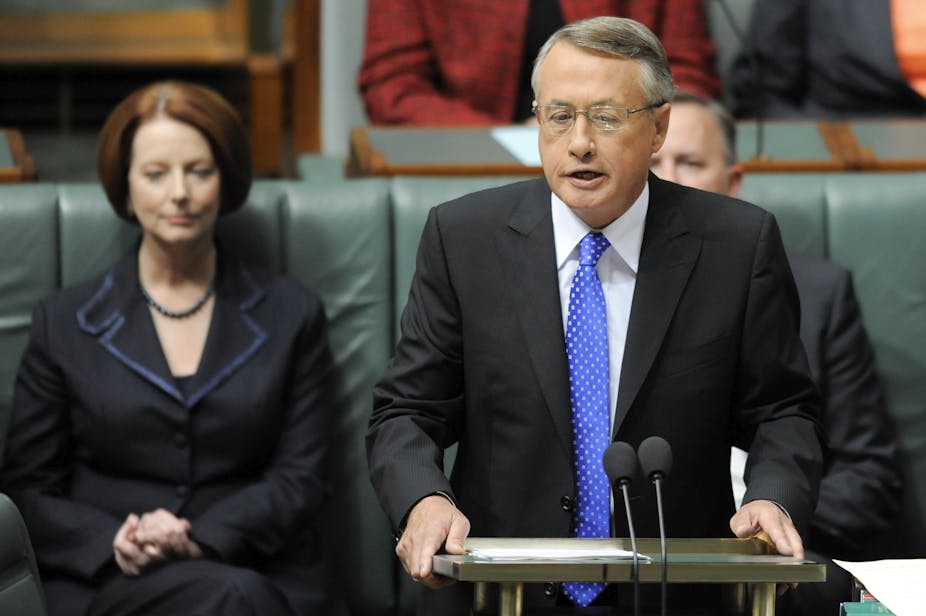As Treasurer Wayne Swan approached the despatch boxes tonight, the nation’s political focus was finally fixed on the Gillard government’s second budget. His speech ended a budget day like no other, with the Speaker having formally stepped down and a former Labor MP taking to the cross-benches for the first time.
From the outset, the government had vowed that this would be a “tough” budget. Indeed, the government had promised it would return the budget to surplus in the coming financial year. If the government had, for some reason, failed to announce a surplus it would be accused of breaking another promise. And with Labor still trying to deal with the claims about the broken carbon tax promise, it was hardly in a position to produce a deficit tonight.
But it was a case of damned if they did and damned if they didn’t return the budget to surplus. Some analysts have questioned the wisdom of aiming for a surplus. They argue that in times of a slowing economy, the government should increase spending to stimulate growth rather than tighten the purse strings. The government, on the other hand, has argued a surplus is necessary to safeguard the nation’s economy in the longer term.
Tonight’s speech by Treasurer Swan contained few surprises as many of the headline initiatives had been provided to the media days ago.
The promise to look after the “battlers” can be seen in the spending on healthcare and education with particular attention given to extending financial assistance to parents with school aged children. The budget introduced the first phase of the National Disability Insurance Scheme as well as greater resources devoted to dental care. Greater assistance to older Australians, some help to small businesses and additional measures to counter the rising costs of living rounded off the main “sweeteners” of the budget. According to Swan, these policies comprise the core of a Labor Party budget and spread the wealth of the resource boom.
While there was spending in some sectors, the public service and defence were the major focus of spending cuts. In these decisions, we can see a hint of what the government was seeking to achieve on a political level.
Traditionally, the Coalition is seen to be the party best placed to manage the national economy with Labor being seen to be the best party for service delivery. With this budget, the Labor government has sought to show that it can enhance service delivery in key areas while still balancing the books. This ties in to Prime Minister Gillard’s desire earlier this year to debate the economy when she famously asked voters whom they trusted to best manage the nation’s finances.
There are some questions about the budget that will be answered over time. The most important of these is whether the surplus can actually be achieved. While $1.5 billion sounds like a lot, a dip in taxation revenue or fall in mining revenue may scupper the government’s hopes of achieving its targets.
Another challenge facing the government is on the political front. The budget provides Labor with an opportunity to reclaim the ascendency in the political debate. And with the government in the doldrums according to opinion polls, this budget could serve as a circuit breaker.
But muddying the waters into which the budget was released were the lingering problems of Slipper and Thomson. Slipper was the focus of intense media scrutiny over the last few weeks and his suspension from the Speaker’s position in parliament provided an unwelcome distraction for Labor as it sought to “sell” its budget.
Similarly, Fair Work Australia’s report on Mr Thomson’s alleged corrupt behaviour at the Health Services Union was ill-timed. Rather than fiscal policy being at the centre of attention, the government had to deal with questions about whether it could make sound political judgements, and motions from the opposition to suspend standing orders during today’s Question Time.
In trying to combat these distractions, the Prime Minister and Treasurer engaged in a range of pre-budget media opportunities. One of these was a meeting where the media was invited to film the PM and Treasurer flicking through the budget while having a casual “cuppa”. While this provided some interesting footage, the jury would be out about whether such a scenario needs to be created in future.
But with the next election getting closer, the government needs something to resonate with voters. Gillard’s grasp on the Labor leadership will once again start to weaken if the opinion polls remain unmoved in the shorter term.
In a political sense, this is indeed the government’s most important budget. How voters respond to it will give greater insight about whether anyone is still listening to Labor.

